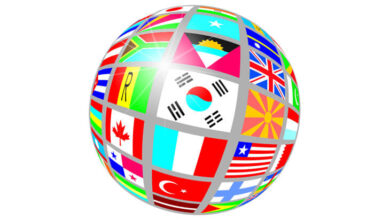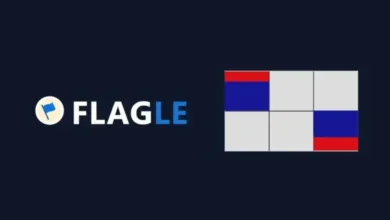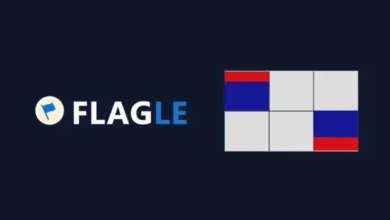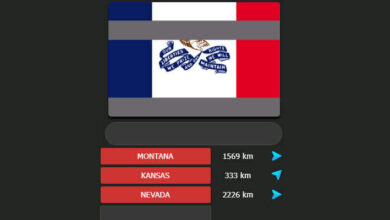Flagle – The Geography Guessing Game Everyone is Talking About

Introduction to Flagle
Flagle is one of those games that seems simple on the surface, yet once you start playing, it draws you in completely. At its core, it’s a geography-based guessing game where players are shown a country’s flag, either in full or partially revealed, and they must identify which country it belongs to. Sounds easy, right? Not quite. The challenge lies in the fact that many flags around the world share similar colors, patterns, and symbols. Think about it—how many flags use red, white, and blue? More than 20 countries! That’s what makes Flagle such a fun brain teaser.
What sets Flagle apart from traditional geography quizzes is its interactivity. Instead of passively answering trivia, you actively engage with the flag, analyzing its symbols, colors, and shapes. Each guess you make gives you feedback, which helps you narrow down the possibilities. It’s a game that combines pattern recognition with geographical knowledge, making it both challenging and educational.
In recent years, online puzzle games like Wordle and Heardle have exploded in popularity. Flagle is part of that wave, but with a fresh twist—it focuses on world knowledge rather than vocabulary or music. That unique angle has made it popular among students, travelers, teachers, and even casual gamers who enjoy testing their memory of world flags.
Another big reason for its rise is accessibility. Flagle can be played directly on a web browser without needing an app download. That makes it convenient for anyone to play a quick round during a coffee break, on the train, or even in a classroom. It’s both fun and practical, which explains why it’s quickly gaining traction worldwide.
In short, Flagle isn’t just a game—it’s a fun way to learn about the world. Whether you’re a geography nerd or someone who just likes casual puzzles, it’s a game that manages to strike the perfect balance between entertainment and education.
The Origins of Flagle
Every trend has a story, and Flagle is no different. The idea behind it didn’t come out of thin air. Instead, it’s part of the puzzle-game boom sparked by Wordle, a word-guessing game that went viral in 2021. Wordle’s simplicity and daily challenge inspired countless variations, each with its own twist—like Heardle for music lovers, Nerdle for math fans, and of course, Flagle for geography enthusiasts.
Flagle was born out of the desire to combine this addictive guessing format with geography. The developers saw an opportunity: why not take the universal recognition of country flags and turn it into a daily guessing game? After all, flags are more than just colorful designs; they represent history, culture, and identity. This added layer of meaning makes guessing them even more exciting.
The game grew quickly thanks to social media sharing. Players started posting their daily results online, much like Wordle users did with their green and yellow squares. In the case of Flagle, people proudly displayed how many attempts it took them to identify the flag, sparking friendly competition among friends and followers.
Teachers and educators also played a role in popularizing Flagle. Many began using it as a classroom activity to help students learn about different countries. It’s far more engaging than a textbook exercise, and because the game updates daily, it keeps students interested with new challenges.
Over time, Flagle established itself as more than just a spinoff—it became a geography learning tool in its own right. Today, it continues to attract new players while fostering curiosity about the world, proving that sometimes the simplest ideas can make the biggest impact.
How to Play Flagle
If you’re new to Flagle, don’t worry—it’s incredibly easy to learn. The beauty of the game lies in its simplicity. Here’s a step-by-step guide to get you started:
- Visit the Game Website – No downloads or sign-ups are needed. Just open your browser, search for Flagle, and start playing.
- Look at the Flag – The game reveals a country’s flag, often only partially at first. Your task is to identify which country it belongs to.
- Make Your First Guess – Type in the name of a country. Don’t worry if you get it wrong—the game gives you hints.
- Use Hints Wisely – Each incorrect guess provides clues such as how far your guess is from the correct answer geographically. This helps you narrow down your options.
- Continue Guessing – You usually have a set number of attempts (similar to Wordle). With each try, you get closer to identifying the right flag.
- Win or Learn – If you guess correctly, congratulations! If not, you still walk away learning something new about a country’s flag.
For example, imagine the game shows you a flag with three horizontal stripes: black, red, and yellow. If you guess Belgium but the hint says the correct country is further east, you might realize it’s actually Germany. Through trial and error, you not only solve the puzzle but also sharpen your geography skills.
What makes the game even more fun is its mix of difficulty levels. Some days you’ll get an easy one like Canada or Japan—flags that are instantly recognizable. Other days, you’ll be scratching your head over lesser-known flags like Eswatini or Bhutan. That unpredictability is part of the thrill.
The game also allows you to share your results, showing how many attempts it took you to get the answer. This adds a social element, letting you challenge friends and compare performance. It’s not just about winning; it’s about learning and having fun along the way.
Features That Make Flagle Unique
Flagle might sound like just another guessing game, but it has several unique features that make it stand out. First and foremost, it uses flags instead of words or music, which instantly gives it an educational edge. Flags are not only visual but also symbolic, carrying deep cultural and political meanings. That means every round of Flagle is an opportunity to learn more about a country’s identity.
Another unique aspect is its hint system. Unlike Wordle, which only tells you if letters are correct or misplaced, Flagle uses geography-based hints. When you guess incorrectly, it tells you how close or far you are from the right answer in terms of distance. This adds an element of strategy—you start thinking about continents, neighboring countries, and relative locations. It transforms the game into a geography lesson without you even realizing it.
Flagle also benefits from being globally inclusive. Every country has a flag, so no matter where you’re from, you might see your own nation represented in the game. This inclusivity makes it appealing to players worldwide, unlike some trivia games that lean heavily toward Western-centric knowledge.
Lastly, Flagle taps into the daily challenge format that has proven addictive for modern audiences. By limiting players to one puzzle per day, it keeps the experience fresh and prevents burnout. This also creates anticipation—players look forward to their daily flag just like they would with Wordle’s daily word.
All these features combined make Flagle more than just a casual distraction. It’s a tool for curiosity, competition, and cultural awareness wrapped in a simple yet brilliant game design.
Benefits of Playing Flagle
At first glance, Flagle might just look like a fun little game to pass the time, but it actually offers a surprising number of benefits. One of the biggest is improving your geography knowledge. Let’s face it—most of us can identify the flags of major countries like the United States, France, or Japan, but what about smaller nations like Vanuatu or Lesotho? Playing Flagle regularly exposes you to a wide range of flags, reinforcing your memory and teaching you new ones.
Another benefit is the educational aspect. Teachers often struggle to get students excited about geography, but Flagle turns learning into a challenge. When students guess wrong, they don’t feel like they’ve failed—they feel like they’re getting closer. This positive reinforcement makes them more likely to remember what they’ve learned.
Flagle is also mentally stimulating. It forces you to use problem-solving skills, pattern recognition, and deductive reasoning. Each wrong guess gives you data, and you have to interpret it carefully to succeed. It’s like a workout for your brain, keeping you sharp while still being enjoyable.
On top of that, Flagle has a social benefit. The ability to share results online encourages friendly competition and community interaction. Friends challenge each other, discuss strategies, and even learn together. In an age where most online interactions revolve around memes and scrolling, Flagle provides a more meaningful way to engage.
Finally, let’s not overlook the fun factor. Games are meant to entertain, and Flagle does that wonderfully. Whether you’re a casual gamer or a hardcore trivia fan, it offers just the right mix of challenge and enjoyment.
In short, Flagle isn’t just a pastime. It’s a tool for learning, a brain exercise, and a way to connect with others—all while being incredibly fun to play.
Why Flagle Appeals to Different Age Groups
One of the most fascinating aspects of Flagle is that it’s not limited to a specific demographic. Unlike many video games that target younger audiences, Flagle bridges the gap between generations. Children, for instance, find it engaging because it introduces them to new countries in a playful way. Instead of memorizing from a textbook, they get to interact with visual cues and hints, making learning fun. Parents often find themselves playing alongside their kids, turning Flagle into a family-friendly educational tool.
For teenagers and young adults, the game has a different kind of appeal. It ties into their love for competition and social sharing. Many post their results on platforms like Twitter, TikTok, and Instagram, inviting others to beat their score. It becomes less of a solitary activity and more of a community challenge.
Meanwhile, adults—especially those who love traveling—see Flagle as a chance to test their world knowledge. Many find it nostalgic, reminding them of geography lessons from school or the trips they’ve taken abroad. For older players, the game serves as a stimulating mental exercise that keeps memory sharp.
By covering such a wide age range, Flagle breaks barriers and creates a shared experience across generations. This inclusivity explains why the game’s popularity keeps spreading like wildfire. It doesn’t matter if you’re 10 or 60—if you enjoy learning and problem-solving, Flagle has something to offer you.
Flagle vs. Other Geography Games
The world of educational games isn’t new. From classroom quizzes to apps like GeoGuessr, players have long enjoyed testing their geography knowledge. However, Flagle sets itself apart in several ways.
1. Simplicity vs. Complexity
While GeoGuessr drops you into random locations on Google Maps and asks you to guess the country, Flagle keeps things simple by focusing on flags. This makes it accessible to everyone, even those who may not be great with landmarks but can recognize visual symbols.
2. Quick Gameplay
Unlike some geography games that take a lot of time, a single round of Flagle only lasts a few minutes. That makes it perfect for short breaks or daily routines, similar to Wordle.
3. Visual Learning
Most geography games rely heavily on maps and text. Flagle, on the other hand, leans into visual memory. Humans are naturally good at remembering colors and shapes, so this approach makes learning easier and more enjoyable.
4. Daily Challenge Format
Many geography apps allow unlimited play, which can sometimes lead to burnout. Flagle limits players to one puzzle per day, keeping the experience fresh and exciting.
5. Social Sharing
While other games can be competitive, Flagle’s sharing format encourages friendly rivalry. Posting results online becomes part of the fun, building a sense of community among players.
In short, while geography-based learning games already exist, Flagle’s unique focus on flags, combined with its simple design and social features, gives it an edge that few others can match.
The Role of Social Media in Flagle’s Growth
It’s hard to ignore the role that social media plays in the success of online games today. Just like Wordle became a global sensation through Twitter shares, Flagle owes much of its popularity to platforms like TikTok, Instagram, and Reddit.
Players love showing off how many attempts it took them to guess the flag. A simple screenshot with the game’s results turns into a mini badge of honor, sparking discussions and debates in the comments. Some people boast about guessing obscure flags on the first try, while others admit to struggling with countries they didn’t even know existed.
TikTok, in particular, has given Flagle a huge push. Short videos showing people’s reactions to difficult flags have gone viral, encouraging viewers to try the game for themselves. On Reddit, communities dedicated to puzzles and geography often highlight Flagle as a daily challenge, further driving interest.
Beyond casual players, educators and travel bloggers also promote the game. Teachers recommend it as a classroom tool, while travel influencers use it as a fun way to connect with their followers. This blend of educational and entertainment value ensures that Flagle appeals to a broad online audience.
Without social media, Flagle might have remained a niche game. But thanks to the sharing culture of today’s internet, it has transformed into a global phenomenon—proving once again that the power of community can turn a simple idea into a worldwide trend.
Tips and Strategies for Winning Flagle
Although Flagle is straightforward, mastering it requires some strategy. If you want to improve your chances of guessing flags correctly, here are some practical tips:
- Start with Common Flags
When in doubt, guess major countries first. Flags like those of Germany, Brazil, or South Africa are unique and can give you useful feedback about direction and distance. - Pay Attention to Colors
Many flags share colors, but their combinations can be telling. For example, red, white, and blue might point to European or American countries, while green, black, and red often indicate African nations. - Notice Symbols and Shapes
Some flags have distinct elements, like Canada’s maple leaf, Japan’s red circle, or Nepal’s unique shape. Spotting these quickly narrows down your options. - Use the Distance Clues Wisely
Each wrong guess tells you how close you are geographically to the correct country. This is where basic map knowledge helps. If you guess Spain and the clue says the correct flag is 4,000 km southeast, think about North Africa or the Middle East. - Learn from Mistakes
Every incorrect guess is a chance to learn. Keep track of flags you struggle with—next time, you’ll be ready. - Practice Outside the Game
If you want to improve, study world flags in your free time. Flashcards, quizzes, or flag apps can help you memorize them faster.
With these strategies, you’ll not only perform better at Flagle but also gain a stronger grasp of global geography. The more you play, the easier it becomes to spot even the most obscure national flags.
Educational Uses of Flagle in Schools
One of the most impressive aspects of Flagle is how seamlessly it blends fun with education. Teachers around the world have begun incorporating it into their classroom activities, and the results are remarkable.
Instead of relying solely on rote memorization, Flagle turns flag recognition into an interactive challenge. Students become more engaged because the game feels less like a test and more like a puzzle to solve. This gamified learning approach increases retention and helps students develop a genuine curiosity about different countries.
Teachers also use Flagle as a starting point for deeper discussions. For example, if the flag of Kenya appears, it opens the door to talk about African history, wildlife, and culture. A lesson on Bhutan’s flag might lead to a conversation about Buddhism and the Himalayas. In this way, the game becomes more than just flag memorization—it becomes a gateway to global awareness.
The daily challenge format works perfectly for schools too. Teachers can assign the puzzle as a warm-up exercise, encouraging students to work together and discuss possible answers. It fosters teamwork, problem-solving, and critical thinking, all while reinforcing geography knowledge.
Flagle’s educational value also extends beyond geography. It teaches pattern recognition, deductive reasoning, and cultural literacy—skills that benefit students in many areas of learning. For this reason, it’s quickly becoming a favorite tool among educators who want to make learning both interactive and impactful.
How Flagle Improves Cultural Awareness
Playing Flagle isn’t just about memorizing shapes and colors—it’s about understanding the world we live in. Every flag tells a story. The stripes, stars, and symbols represent a nation’s history, struggles, and identity. For example, the stars on the U.S. flag stand for its states, while the green in Nigeria’s flag symbolizes agriculture and natural wealth. By engaging with these designs daily, players unconsciously learn about the cultural values different nations hold dear.
This aspect of Flagle helps break down stereotypes. Many people realize that countries they had barely thought about actually have rich histories reflected in their national flags. When you guess a flag and then read about its meaning, you start appreciating that culture in a new way. For example, the dragon on Bhutan’s flag represents strength and the country’s deep spiritual heritage, while the sun on Argentina’s flag links to independence and freedom.
Cultural awareness through Flagle also extends to recognizing diversity. Unlike games that mainly highlight Western countries, Flagle includes every nation—big or small. This representation matters because it teaches inclusivity. Players quickly see that the world is vast and varied, and every flag, no matter how obscure, is worth learning about.
By broadening horizons and encouraging curiosity, Flagle becomes more than entertainment—it’s a cultural bridge connecting players to the wider world.
The Psychology Behind Why We Love Flagle
Ever wondered why games like Flagle are so addictive? The answer lies in psychology. Humans are naturally drawn to puzzles because they trigger our problem-solving instincts. Each time you guess a flag, your brain rewards you with a hit of dopamine, the “feel-good” chemical that motivates us to keep going.
Another factor is the daily challenge format. By limiting the game to one puzzle per day, Flagle taps into the concept of “scarcity.” When something is limited, we value it more. That’s why people look forward to logging in daily, excited to test themselves.
Flagle also benefits from the progress principle. Each wrong guess still provides helpful feedback, which makes you feel like you’re getting closer to the solution. This sense of progress keeps players engaged, even when the puzzle is tough.
Finally, there’s the social validation aspect. Sharing results online and comparing them with friends gives players a sense of belonging and achievement. It’s not just about solving the puzzle; it’s about being part of a community that celebrates small wins together.
Put simply, Flagle works because it combines learning, achievement, and social interaction into one addictive package. That psychological mix is what keeps players coming back day after day.
Flagle for Travelers and Explorers
For people who love to travel, Flagle is more than a game—it’s a test of memory and global experiences. Frequent travelers often find themselves recognizing flags from countries they’ve visited, which adds a personal touch to the challenge. Guessing a flag isn’t just about remembering colors; it’s about recalling the people, culture, and landscapes associated with that country.
For those planning trips, Flagle can even serve as a learning tool. By becoming familiar with the flags of future destinations, travelers gain a sense of connection before they arrive. For example, recognizing Peru’s flag before visiting Machu Picchu might make the experience feel even more meaningful.
Travel bloggers and influencers also enjoy incorporating Flagle into their content. They use the game as a fun way to engage their followers while sharing travel stories connected to different flags. This combination of gaming and storytelling adds depth to their posts, making geography relatable and exciting.
Ultimately, for explorers at heart, Flagle serves as a reminder that the world is vast and waiting to be discovered. It keeps wanderlust alive, even when you’re sitting at home.
The Future of Flagle and Similar Games
As with any popular online trend, the big question is: what’s next for Flagle? While no one can predict the future perfectly, several possibilities stand out.
First, we might see expanded versions of the game. Currently, most versions focus on guessing a country’s flag, but developers could introduce variations like regional challenges, historical flags, or even state and city flags. This would add depth and keep players engaged longer.
Second, there’s the potential for mobile app versions. Although Flagle works in browsers, many users prefer apps for convenience. A dedicated app could bring in features like leaderboards, multiplayer modes, and progress tracking.
Third, Flagle could collaborate with educational institutions. Schools might adopt official versions of the game tailored for classrooms, complete with teacher tools and student progress reports. This would solidify Flagle’s reputation as both a game and an educational resource.
Finally, the game may inspire a new wave of culture-based puzzles. Just like Wordle inspired spin-offs in music and math, Flagle could pave the way for games centered on world monuments, national dishes, or traditional clothing.
One thing’s for sure—Flagle has shown that learning and fun can go hand in hand. Its success suggests that the future of educational gaming is brighter than ever.
Conclusion
Flagle isn’t just another online fad—it’s a game that combines education, culture, and entertainment in a simple yet brilliant format. By challenging players to recognize world flags, it sharpens geography skills, improves cultural awareness, and even builds community through shared experiences.
Its universal appeal lies in its simplicity and inclusivity. Anyone can play, from schoolchildren learning about the world for the first time to seasoned travelers testing their global knowledge. Whether you play for fun, for competition, or as a learning tool, Flagle offers something unique that other games simply can’t replicate.
As online games continue to evolve, Flagle stands out as a shining example of how technology can make learning engaging and rewarding. It’s proof that the world is more connected than ever, and sometimes, all it takes to appreciate that is a flag on your screen.




